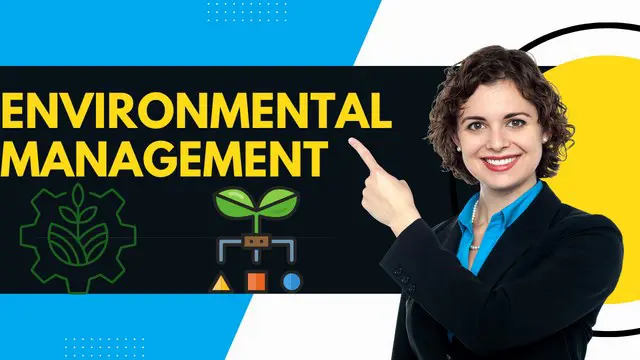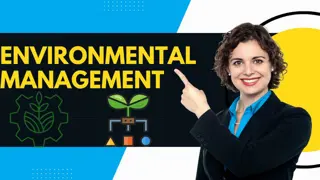
Environmental Management Diploma Level 5
CPD Certified| Free PDF Certificate | Lifetime Access | Learner Support | No Hidden Fees | 100% Success Rate
EDURISE
Summary
- Certificate of completion - Free
- Reed courses certificate of completion - Free
- Tutor is available to students
Add to basket or enquire
Overview
Elevate Your Understanding of Environmental Management
In a world where environmental concerns take center stage, the demand for skilled professionals in environmental management is soaring. The Environmental Management course is your gateway to a career, business, or profession deeply committed to sustainability and ecological responsibility.
Demand for Environmental Stewardship:
- With global awareness of environmental issues on the rise, there is an increasing demand for experts who can navigate and address these challenges.
Business and Environmental Responsibility:
- Companies and organizations are under growing pressure to adopt eco-friendly practices, creating a niche for environmental management specialists.
Career with Purpose:
- A career in environmental management offers the unique opportunity to make a substantial impact on the environment and society.
Why Choose Environmental Management:
Champion Sustainability: Environmental managers lead the charge in fostering sustainable practices within organizations and communities.
Global Relevance: The knowledge gained in this field can be applied worldwide, making it a globally relevant expertise.
Problem Solver: Environmental management professionals tackle pressing issues such as pollution control, resource conservation, and sustainable development.
Steward of Nature: If you have a deep love for the environment and a desire to protect it, this field allows you to be a steward of nature.
High Demand: The demand for environmental management expertise continues to grow across sectors, offering a stable and rewarding career path.
Course Highlights:
Understanding Environmental Management: Gain insights into the core principles and practices of environmental management.
Environmental Challenges: Explore the pressing environmental challenges of our time, from climate change to biodiversity loss.
Regulatory Compliance: Learn about environmental laws, regulations, and compliance, ensuring organizations adhere to eco-friendly standards.
Sustainable Solutions: Discover innovative and sustainable solutions to address environmental issues, fostering a greener future.
Business and Environmental Responsibility: Understand the critical role of businesses in environmental stewardship and how to implement eco-friendly practices within organizations.
Community and Global Impact: Learn how environmental management extends beyond individual organizations and impacts communities and the planet at large.
The Environmental Management course is your guide to understanding and addressing the environmental challenges of our time. Whether you're a professional seeking to integrate eco-friendly practices into your organization or an eco-conscious individual, this course equips you with the knowledge to make a difference.
Free Gift
- Course Completion PDF Certificate
- Tutor Support
Curriculum
Course media
Description
Learning Outcomes:
Foundational Understanding of Environmental Management:
- Develop a comprehensive understanding of the principles, objectives, and importance of environmental management, as outlined in the introductory module.
Environmental Management Fundamentals and Goals:
- Gain knowledge of the fundamental concepts, goals, and strategies of environmental management, enabling you to establish a strong foundation in this field.
Legal and Business Aspects of Environmental Management:
- Understand the intersection of environmental management with business operations and legal regulations, ensuring compliance and sustainable practices.
Standards, Monitoring, and Environmental Management Systems:
- Learn about environmental standards, monitoring techniques, modeling, eco-auditing, and the implementation of environmental management systems.
Economic Aspects and Environmental Management:
- Explore the economic dimensions of environmental management, including the cost-benefit analysis and economic implications of environmental decisions.
Module Descriptions:
Introduction (Module 1):
- This module provides an introduction to environmental management, setting the stage for the course content that follows.
Environmental Management Fundamentals and Goals (Module 2):
- Module 2 delves into the fundamental concepts and objectives of environmental management, highlighting the goals and strategies used to address environmental challenges.
Environmental Management—Business and Law (Module 3):
- Module 3 focuses on the intersection of environmental management with the business environment and legal regulations, emphasizing the importance of compliance and sustainability.
Standards, Monitoring, Modeling, and Environmental Management Systems (Module 4):
- This module explores environmental standards, monitoring methods, modeling techniques, eco-auditing practices, and the implementation of environmental management systems.
Environmental Management and Economics (Module 5):
- Module 5 investigates the economic dimensions of environmental management, including the evaluation of costs and benefits and the economic implications of environmental decisions.
Environmental Risk Management, Impact, Hazard, and Risk Assessment (Module 6):
- Module 6 focuses on environmental risk management, impact assessment, hazard identification, and risk assessment in the context of environmental management.
Environmental Management and Science (Module 7):
- This module highlights the role of science in environmental management, emphasizing the scientific principles that underpin environmental decision-making.
Ecosystem Management (Module 8):
- Module 8 explores the management of ecosystems and the critical role they play in environmental sustainability.
Environmental Management Approaches (Module 9):
- The final module examines various approaches to environmental management, offering insights into the diverse strategies used in this field.
This course covers a wide range of topics, from the fundamentals of environmental management to its legal, economic, and scientific dimensions, making it a comprehensive resource for those interested in this vital field.
Certificate of Completion
After completing the Environmental Management diploma course, you will be able to obtain your free PDF certificate of course completion.
Who is this course for?
Ideal Audience for this Course:
Environmental Enthusiasts and Novices:
- Individuals who have a budding interest in environmental management and want to build a strong foundational knowledge.
Sustainability Advocates:
- Environmentalists and sustainability advocates looking to deepen their understanding of environmental management principles and strategies.
Students and Academics:
- Students pursuing degrees in environmental science, business, law, or related fields, as well as academics interested in expanding their knowledge.
Professionals Seeking Environmental Literacy:
- Professionals from various sectors who aim to enhance their environmental literacy and integrate eco-friendly practices into their work.
Business Owners and Managers:
- Business owners and managers interested in understanding the business implications of environmental management and how to align their operations with eco-friendly practices.
Legal Professionals and Compliance Officers:
- Legal professionals, compliance officers, and regulatory experts seeking to grasp the legal aspects of environmental management and compliance.
Policy Makers and Government Officials:
- Policymakers and government officials involved in environmental policy and decision-making processes who want to make informed choices.
Environmental Consultants:
- Environmental consultants looking to broaden their expertise in environmental management and offer comprehensive services to clients.
Scientists and Researchers:
- Scientists and researchers specializing in environmental science who wish to understand the practical applications of their research.
Educators and Trainers:
- Educators and trainers in environmental studies who want to access course content to enrich their teaching materials and methods.
This course caters to a diverse audience, providing comprehensive insights into environmental management topics. Whether you're a beginner seeking a basic understanding or a professional looking to delve deeper into environmental management, this course equips you with valuable knowledge for a more sustainable future.
Requirements
The Environmental Management course has no formal entry requirements.
Career path
- Environmental Management Trainee: Entry-level position with a typical UK salary ranging from £20,000 to £30,000 .
- Environmental Manager or Sustainability Coordinator: With experience and qualifications, salary can advance to between £31,000 and £60,000 .
- Senior Environmental Consultant or Director of Environmental Affairs: Experienced professionals in these roles may earn £61,000 to £100,000
Questions and answers
Currently there are no Q&As for this course. Be the first to ask a question.
Certificates
Certificate of completion
Digital certificate - Included
Reed courses certificate of completion
Digital certificate - Included
Will be downloadable when all lectures have been completed
Reviews
Currently there are no reviews for this course. Be the first to leave a review.
Legal information
This course is advertised on reed.co.uk by the Course Provider, whose terms and conditions apply. Purchases are made directly from the Course Provider, and as such, content and materials are supplied by the Course Provider directly. Reed is acting as agent and not reseller in relation to this course. Reed's only responsibility is to facilitate your payment for the course. It is your responsibility to review and agree to the Course Provider's terms and conditions and satisfy yourself as to the suitability of the course you intend to purchase. Reed will not have any responsibility for the content of the course and/or associated materials.


